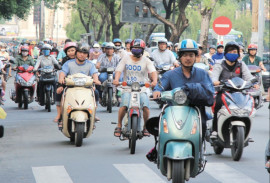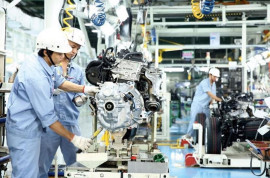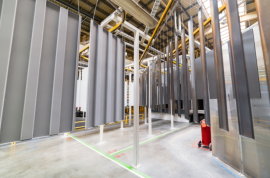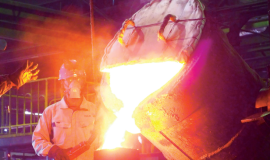Emidas Magazine conducted interviews with business support organizations and both Vietnamese and foreign-invested enterprises (FDIs) operating in Vietnam to reflect on the outcomes of 2024 and explore the outlook for Vietnam's industrial sector in 2025.

Reflections on 2024 and Outlook for 2025
Perspectives from Industry Leaders on Vietnam’s Economy and Manufacturing Sector

JCCH Chairman Takao Nozaki: Deepening Japan-Vietnam Cooperation Amid Global Uncertainty
2024 highlighted the increasing importance of Vietnam for Japanese businesses amidst rising geopolitical risks globally. We’ve continued to witness strong, consistent support from local governments in areas such as Ho Chi Minh City, Dong Nai, Long An, Binh Duong, and Ba Ria-Vung Tau—regions with longstanding, friendly relations with Japan. This trust stems from Japanese companies’ commitment to compliance, tax transparency, and job creation.
A key milestone was our roundtable with the Ho Chi Minh City People's Committee in December. The session ran over time due to passionate discussions, but it led to notable progress on nearly all 16 new JCCH proposals. We also received a strong proposal from the city to enhance Japan-Vietnam corporate interaction through business matching and the appointment of coordinators—initiatives we are ready to support.
Nevertheless, we recognize a declining Japanese presence in Vietnam amid shifting global dynamics. With China establishing itself as a dominant global player and Korea and Taiwan advancing in cutting-edge technology, Japan must reassess its role in Vietnam. Respecting each other’s culture and values while advancing economic cooperation will be vital in 2025. Japanese enterprises must continue contributing to Vietnam’s growth via job creation and technology transfer—deepening trust and collaborative problem-solving.

VIETNAM ASSOCIATION FOR SUPPORTING INDUSTRIES (VASI) Chairman Phan Dang Tuat: Strong Momentum for Supporting Industries in 2024
2024 was a landmark year for Vietnam’s supporting industries, with progress seen across three major areas:
Rising Enterprise Participation: Membership at VASI doubled to around 400 official members, spanning key sectors like machinery, electronics, plastics, and rubber, with close cooperation extended to over 1,000 companies nationwide.
Increased Global Engagement: Many local companies successfully secured orders from global giants, expanding their markets and enhancing competitiveness and recognition.
Push Into High-Tech: Companies actively invested in advanced technologies and equipment—especially in aerospace components—raising production capabilities and edging closer to becoming a hub for high-quality manufacturing.
Still, challenges persist: high loan interest rates, rising land and construction costs, volatile equipment prices, and disruptions from geopolitical events like conflicts in the Middle East and U.S.-China trade tensions. These all put pressure on Vietnamese exporters and the broader supply chain.

AHK Vietnam Representative - Mr Peter Kompalla: Strengthening the Vietnam-Germany Partnership
The year 2024 marked a significant milestone in the business environment between Germany and Vietnam. Vietnam has emerged as a hub driving economic growth in Southeast Asia, and German enterprises have increasingly deepened their engagement across various sectors. The German Chamber of Commerce and Industry in Vietnam (AHK Vietnam) experienced both achievements and challenges throughout the year.
In 2024, over 500 German companies demonstrated a strong presence in Vietnam, leveraging the country’s strategic location, youthful workforce, and rapidly improving infrastructure. A major event held in Hanoi in November to celebrate the Germany-Vietnam partnership highlighted German investment and collaboration in manufacturing, renewable energy, and technology. Additionally, the arrival of large business delegations from German states such as Thuringia, Saxony-Anhalt, Brandenburg, Hesse, and Rhineland-Palatinate, along with delegations from the textile and recycling industries, underscored the strong interest in Vietnam as a reliable trade and investment partner. AHK Vietnam greatly appreciates the support from the Vietnam Association for Supporting Industries (VASI) in connecting German businesses with high-quality local suppliers.
The year 2025 will mark the 50th anniversary of diplomatic relations between Vietnam and Germany, presenting an opportunity to further advance bilateral cooperation. Economically, Vietnam is set to play an increasingly dynamic role for German buyers. Vietnamese companies are enhancing production processes, prioritizing sustainability, and embracing advanced technologies—creating significant opportunities for German businesses seeking reliable sourcing partners in Asia.
AHK Vietnam will continue to strengthen connections through various cooperative events such as business delegations and consultation days in Germany. Two key events to highlight are: first, the “Automation – Made in Germany” symposium on May 6 in Ho Chi Minh City, where the latest German automation technologies supporting Vietnam’s industrial competitiveness will be showcased; and second, a delegation of Vietnamese “TechDesign” companies visiting Germany in late May to present “Made in Vietnam” services in IT and engineering.
Furthermore, the “Procurement Initiative” will be relaunched in collaboration with the German Association for Supply Chain Management, Procurement, and Logistics (BME), providing VASI members opportunities to find new business partners in Germany.
As a trusted intermediary, AHK Vietnam will continue to facilitate dialogue, build trust, and provide tailored support to companies. We are committed to helping enterprises navigate the complexities of bilateral trade and promote sustainable operations, thereby strengthening this crucial partnership. Building on the strong foundation laid in 2024, we look forward to further growth, innovation, and prosperity in the coming year. Through this cooperation, Germany and Vietnam will continue to foster progress in business and community development, contributing to mutual success. We are excited to realize the full potential of this longstanding relationship together.

Mr Cheng, Chia-Lin, General Director, Digiwin Software Vietnam JSC:
Amid geopolitical shifts, Vietnam’s manufacturing sector is asserting its position with robust growth, particularly through increasingly deep trade relations with the United States. With bilateral trade projected to reach nearly USD 90 billion in 2024, Vietnam has become the fourth-largest trade surplus partner of the U.S.—a testament to the country’s policy agility and its growing importance in the global supply chain.
The Vietnamese government plays a guiding role in helping businesses align with international standards. A prime example is the requirement for companies to report greenhouse gas inventories—both a compliance obligation and an opportunity to enhance product competitiveness. However, the introduction of carbon taxes presents new cost challenges, compelling businesses to simultaneously meet ESG (Environmental, Social, and Governance) criteria while improving cost management efficiency.
In facing these current challenges, controlling production costs, conserving energy, and optimizing electricity consumption have become critical factors for maintaining competitive advantage. Enterprises must proactively pursue digital transformation and build accurate carbon emission data systems to both comply with regulations and support sustainable development.
In conclusion, while Vietnam’s manufacturing sector has achieved impressive milestones, it continues to face significant pressure from global market dynamics and evolving trade policies. Businesses must uphold a spirit of innovation and proactive adaptation to remain resilient and thrive in an increasingly competitive environment.

Mr Ho Ngoc Toan, Vice President, Automech JSC:
From Automech’s perspective, 2024 marked a year of notable progress for Vietnam’s economy and industrial sector. Despite the impact of global uncertainties, Vietnam maintained stable growth, particularly in the processing and manufacturing industries. Increased investment from both domestic and international enterprises played a foundational role in reinforcing and accelerating economic development. Notably, the automotive, parts manufacturing, and precision engineering sectors continued to attract substantial foreign investment. At the same time, the supporting industries made solid advancements, contributing to higher localization rates and reduced dependence on imports.
However, alongside these achievements, Vietnamese businesses continue to face significant challenges. Intensifying global competition demands continuous innovation and enhanced competitiveness. The shortage of highly skilled technical labor remains a critical issue, while unpredictable factors such as climate change and global trade conflicts continue to elevate economic risks.
Looking ahead to 2025, Automech believes that the supporting industries are poised for significant breakthroughs. Large-scale public investment projects—such as high-speed railways, airports, and expressways—are expected to drive demand for products and services in this sector. Additionally, ongoing geopolitical instability may prompt companies to shift manufacturing operations to Vietnam. Nevertheless, to fully seize these opportunities, domestic enterprises must proactively enhance their production capabilities, rigorously meet international standards, and make concerted efforts to participate more deeply in global supply chains.

Mr Masahiro Kagawa, Sales Manager, Techno Vietnam Industries:
In 2024, on the surface, there were no clear signs that the business situation had deteriorated. Business activities remained moderate—orders came in steadily, and the volume of transactions was stable. It wasn’t bad, but it wasn’t particularly strong either. One could say that “everything kept moving, though only at a just-sufficient level.” However, we often heard from customers remarks like: “The economy seems to be recovering, but production hasn’t returned to pre-COVID levels,” or “We’re not sure whether things will get busier in the future,” reflecting a general sense of economic uncertainty.
According to information from Vietnamese acquaintances, some state-owned enterprises still haven't received budgets and are not getting government support as they used to. In the real estate sector, there are cases of delayed salary payments, or employees remaining on staff despite not being paid. In southern Vietnam’s export-oriented factories operated by Vietnamese firms—such as in textiles, footwear, bags, and furniture—there have been mass layoffs post-COVID, numbering in the tens of thousands. However, industry insiders suggest that the actual figures might be even higher. During weekend family visits to shopping malls, while the malls appeared busy, conversations with sales staff often revealed: “In the past, customers would buy items at full price, but now, unless there’s a discount of nearly 50%, they don’t make purchases.” In fact, at the shopping mall my family frequents, the number of closed stores has become increasingly noticeable. Although things may seem lively on the surface, it felt like something was amiss beneath—that was our impression of 2024.
Looking ahead to 2025, I believe the conditions of Vietnam’s major export markets will play a crucial role in the country’s economic trajectory. Based on media reports and think tank analysis, signs of concern are emerging: China’s economy is weakening; the U.S. economy is becoming increasingly polarized (with the middle class disappearing, and uncertainty around whether the reported economic strength is genuine); Japan is struggling with inflation and rising prices; and Europe is seeing news such as the closure of Volkswagen factories. Added to this are ongoing geopolitical tensions—like the war in Ukraine, unrest in the Middle East, the risk of conflict in East Asia (including China, Taiwan, and North Korea), and policy shifts under the new U.S. president. Given that Vietnam’s economy is heavily reliant on external demand, it is very likely that developments in these export markets will significantly shape its economic outlook in 2025.

Mr Hiroaki Kato, General Director, Tri-Wall Vina Pack:

Mr Hiroshi Sugita, Global Procurement Director, FUJIFILM VIETNAM:
In December 2023, we established the Global Procurement Division under FUJIFILM VIETNAM—the company responsible for selling Fujifilm products in Vietnam. Our objective is to identify potential component suppliers in the ASEAN region to gradually shift sourcing away from China. The division is based in Ho Chi Minh City, with a sourcing scope that includes Vietnam, the Philippines, Malaysia, Indonesia, Singapore, Thailand, Myanmar, and Taiwan. Targeted components include plastics, stamped metal parts, machined parts, die-cast items, chemical components, polished lenses, FPCs, and batteries—for use in digital cameras, interchangeable lenses, and instant cameras.
The year 2024 marked the launch of our supplier scouting activities in ASEAN, with Vietnam as the primary focus. We visited approximately 200 Japanese suppliers and dozens of Vietnamese companies to learn about their strengths in Quality, Cost, and Delivery (QCD). We highly appreciate the efforts made by local suppliers to improve their technical capabilities.
Looking ahead to 2025, in light of potential policy changes from the new U.S. President—especially increased import tariffs on Chinese goods—that may affect global manufacturing, we plan to further accelerate supplier development efforts in ASEAN, particularly in Vietnam. The key challenge lies in identifying suppliers that meet QCD standards comparable to those in China, while also working alongside domestic enterprises to help them enhance their technology and production capabilities.
Although our scale remains modest, we hope to contribute meaningfully to the long-term development of Vietnam and the ASEAN region through this initiative. We sincerely look forward to your continued support and valuable guidance in the year to come.




















